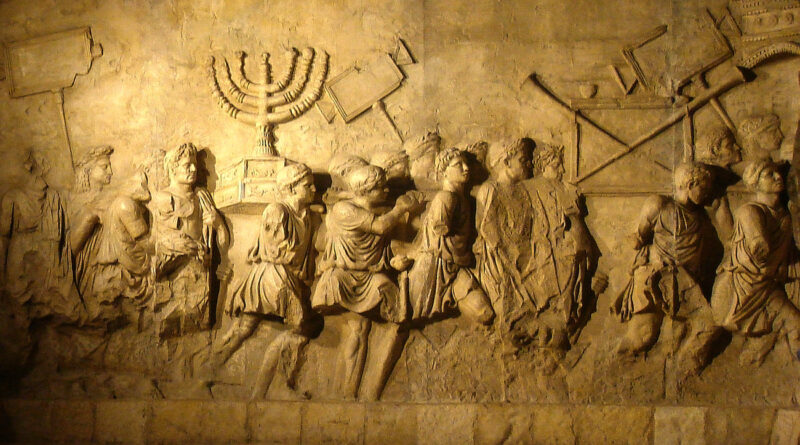Tisha b’Av in a Time of Pandemic
To fast, or not to fast on Tisha b’Av in a time of a pandemic?
This is a question I’m grappling with, 13 hours into the fast.
First, there’s the question of whether we should fast at all on Tisha b’Av now that we have the state of Israel.
If you’re going to fast on Tisha b’Av, I think it’s important to fast for the right reasons.
I don’t fast because I’m mourning the destruction of the Temple 1,930 years ago today. The truth is the destruction of the Temple probably saved Judaism – it forced us to adapt and center our faith on prayer instead of animal sacrifice.
On the other hand, we should fast as a reminder of why the Temple was destroyed in the first place. And I’m not talking about the rabbinic story of how the Temple was destroyed because of sinat chinam, baseless hatred. The Temple was destroyed because of hubris. Little Israel tried to take on Rome. The zealots, the extremists, those who brooked no compromise, won out over the moderates, and the result was utter defeat.
But more than a reminder of what went wrong 2,000 years ago, I fast as a reminder of what’s wrong today, and that I’m not doing enough to fight those wrongs. I fast because the world is still a very broken place – the messiah hasn’t come yet, times are dark, we need to redouble our efforts.
Two years ago I wrote about “Fasting and Brokenness,” and listed some of the things broken in the world.
The situation in 2020 is even bleaker than it was in 2018. Polarization is worse than ever. Dictators, strongmen, demagogues, are growing in power. Trump has suggested postponing elections (which would be interesting since it would mean on January 20 Chuck Grassley would become President). And there’s a pandemic killing thousands of people every day, and the governments in Israel and the US are both fumbling. The economy crashed by 9% last quarter.
The world is in a real mess. I’m inherently optimistic; I like to believe that everything we’re going through right now are the “birth pangs of the messiah,” the dark times that come before salvation. I like to believe that come November, Trump will be voted out of office, the Democrats will take back the Senate, and America can get back on a more righteous, caring path. I’m less optimistic about politics in Israel. I doubt Benny Gantz will ever sit in the prime minister’s seat. Netanyahu will do something cause the government to fall to steal that from him.
So all the reasons I usually fast on Tisha b’Av – to remind myself of how broken the world is, how far we have to go to create a world that lives up to our ideals – are there in spades this year.
On the other hand, there’s a pandemic going on. Some rabbis have said no one should fast this year, for health reasons.
The chief rabbis of Israel have said anyone who tested positive for coronavirus, even if they are asymptomatic, or anyone with symptoms, even if they haven’t been tested, is forbidden to fast.
Some rabbis, including Rabbis Yona Weiss, Mordechai Willig, and Herschel Schachter, Orthodox rabbis from Chicago, said that anyone who is immune-compromised or over the age of 60 should not fast unless they get permission from a doctor, but they should eat small amounts, below the minimum threshold that counts as technically breaking the fast, which is to say a shot glass of water and/or chopped up food not more often than once every nine minutes.
Some rabbis, for example, Rabbi Joseph Feigelstock, a Chabad rabbi from Uruguay, say no one should fast. His argument is that this is a time of danger. The pandemic is everywhere – in some cases maybe a greater percent, on other places lower, but there is no place free from coronavirus. Doctors say that even though a fast by itself poses no danger to a healthy person, it does lower your resistance to disease, and that increases the risk of getting sick. So no one should fast.
I think another argument in favor of no one fasting is that if you say some people are forbidden to fast, but others are still obligated, some of the people who should NOT fast will fast anyway. They don’t want to be left out. They don’t want to do less than others. It’s their custom, etc. But if you forbid anyone to fast, they won’t feel left out. They’ll see it’s a community thing.
There is a precedent for communities not fasting during a pandemic, even on Yom Kippur. There’s a story told of a rabbi who during a cholera epidemic in his town drank a glass of water on the bimah on Yom Kippur to make the point that his community was not fasting that year.
The danger right now is clearly less than having a cholera epidemic sweeping through your community. But as Rabbi Feigelstock points out, that’s a difference of degree – danger is still there.
If I were the rabbi for a community, I would rule as Rabbi Feigelstock did – I would tell my community not to fast, but partly because reason that I see it as so important that those who have any risk should not fast should be supported by the community.
But now I’m just an individual.
So on the one hand, I feel I have more reason to fast than ever. On the other hand, with a pandemic raging, there are reasons not to fast.
I still haven’t decided what to do. There is an opinion that in these days we should break the Tisha b’Av fast after mincha. Even though I don’t normally go by that opinion, and instead follow Rabbi Golinkin’s opinion in the same document that we should fast fully on Tisha b’Av, maybe this year breaking the fast after mincha is a compromise. I’m sure it’s the later hours of the fast as dehydration increases, etc., that are most potentially dangerous to one’s health.


